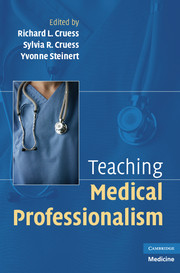Book contents
- Frontmatter
- Contents
- List of Contributors
- Foreword by William M. Sullivan
- Introduction
- PART ONE WHAT IS TO BE TAUGHT
- PART TWO THEORY
- PART THREE PRINCIPLES
- PART FOUR PRACTICE: CASE STUDIES IN TEACHING PROFESSIONALISM ACROSS THE CONTINUUM
- APPENDIX A Definitions of Professionalism
- APPENDIX B Core Attributes of Professionalism
- APPENDIX C The Teaching of Professionalism: Vignettes for Discussion
- APPENDIX D A Matrix for “Matching” Teaching Methods to Attributes
- APPENDIX E Sample Grid for Use with Discussion of Vignettes
- APPENDIX F Sample Questions to Guide Discussion about the Social Contract: Small-Group Leaders' Guide with Suggested Responses
- APPENDIX G Professionalism Program for Residents: Suggested Outline for Small Group Facilitators
- APPENDIX H Sample Evaluation Form for Residents' Half-Day Program on Professionalism
- Index
Foreword by William M. Sullivan
Published online by Cambridge University Press: 01 September 2009
- Frontmatter
- Contents
- List of Contributors
- Foreword by William M. Sullivan
- Introduction
- PART ONE WHAT IS TO BE TAUGHT
- PART TWO THEORY
- PART THREE PRINCIPLES
- PART FOUR PRACTICE: CASE STUDIES IN TEACHING PROFESSIONALISM ACROSS THE CONTINUUM
- APPENDIX A Definitions of Professionalism
- APPENDIX B Core Attributes of Professionalism
- APPENDIX C The Teaching of Professionalism: Vignettes for Discussion
- APPENDIX D A Matrix for “Matching” Teaching Methods to Attributes
- APPENDIX E Sample Grid for Use with Discussion of Vignettes
- APPENDIX F Sample Questions to Guide Discussion about the Social Contract: Small-Group Leaders' Guide with Suggested Responses
- APPENDIX G Professionalism Program for Residents: Suggested Outline for Small Group Facilitators
- APPENDIX H Sample Evaluation Form for Residents' Half-Day Program on Professionalism
- Index
Summary
This is a pioneering book. It brings together leading figures in both the theory and the practice of teaching professionalism in medicine. The volume's chapters provide a thorough and useful guide to one of the most important topics in medical education today: how to ensure that future physicians can meet the increased expectations the public now places on medicine. The key to securing medicine's future, the authors of the volume argue, lies in understanding, transmitting, and enhancing medical professionalism.
The public wants both better medical care and a profession more responsive to its needs. But most of all, people want competent and caring physicians who are committed to the healing of their patients. Nearly all of us will be patients. We will be vulnerable and in need of medical expertise. We will want the best prepared and most knowledgeable doctors we can find. But more than that, we will need to be able to trust that our physicians will be dedicated above all else to care for us with all their ability.
ADDRESSING THREATS TO THE INTEGRITY OF THE PRACTICE OF MEDICINE
Medicine as a profession is defined by its blending of expertise in healing with responsibility for patient care. Teaching professionalism, as the authors present it, directly addresses the formation of physicians who manifest this needed integration of expertise with dedication to the care of patients. They write this in full knowledge that medicine's integrity has for some time been under threat. Those threats to the integrity of medical practice are two.
- Type
- Chapter
- Information
- Teaching Medical Professionalism , pp. ix - xviPublisher: Cambridge University PressPrint publication year: 2008



